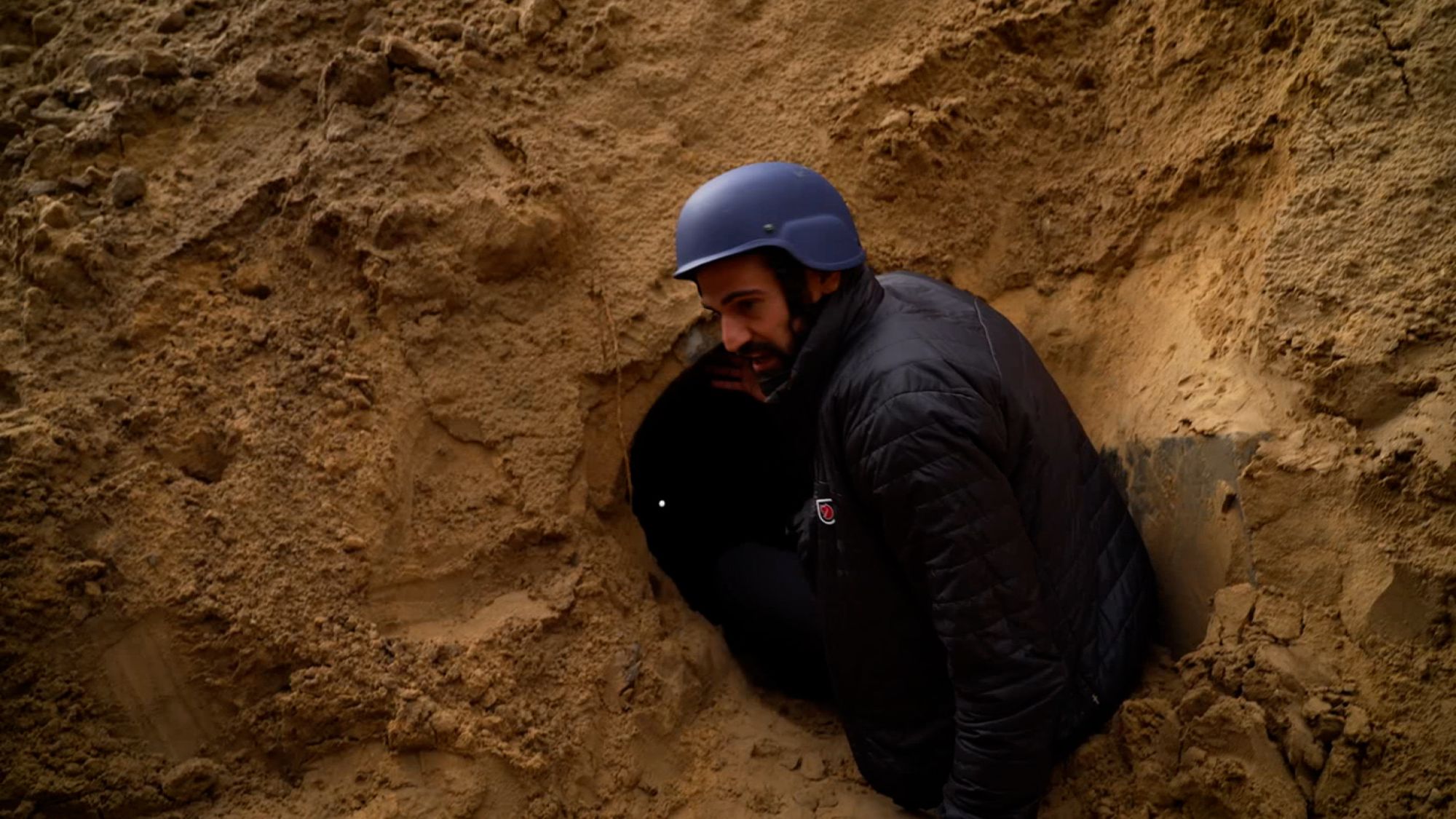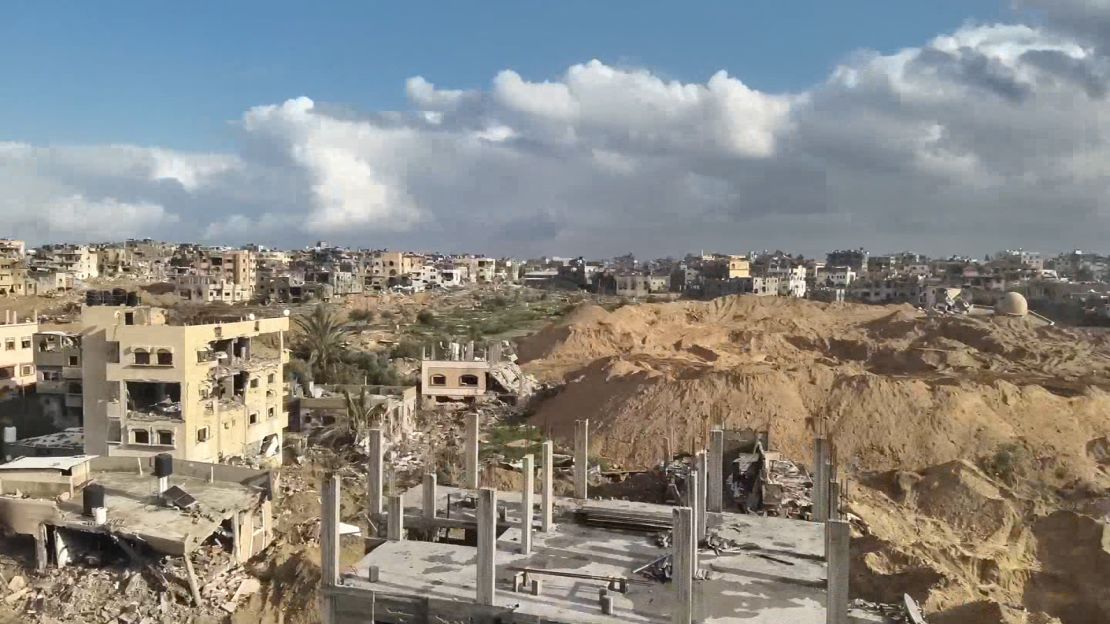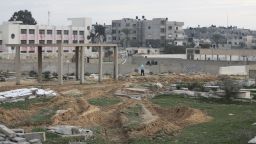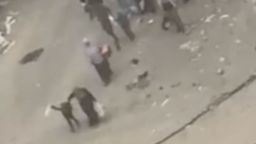Israel claims a tunnel ran through this Gaza cemetery it destroyed. A visit to the site raised more questions than answers

A large void fills the space where rows of graves once stood.
The gaping hole is all that is left after the Israeli military excavated the western side of the Bani Suheila cemetery, near Khan Younis in southern Gaza, claiming a Hamas tunnel ran directly through the site and that Hamas militants attacked Israeli troops from here.
A week after a CNN investigation found that the Israeli military damaged or destroyed at least 16 cemeteries in Gaza since the beginning of the war, the Israeli military invited CNN into Gaza to explain why it partially destroyed one of those cemeteries.
But Israeli commanders failed to prove their claim during a three-hour visit to the Bani Suheila cemetery and the surrounding area.
On Saturday, the Israel Defense Forces (IDF) took CNN into a tunnel near the Bani Suheila cemetery and into an underground command center that the military said was below the cemetery.
However, IDF commanders declined to show reporters the tunnel shaft they said emerged inside the cemetery, claiming there was sensitive machinery underground and that the structure was unstable.
“The whole thing can collapse,” said Brig. Gen. Dan Goldfuss, the commander of the IDF’s 98th Division. “You have to walk to the edge. The edge is not secure, it can collapse.”
A spokesman for the Israeli military said they would provide video of the tunnel shaft in the enormous hole, but never did.
Instead, the IDF provided drone footage that showed two other tunnel entrances – one of which CNN entered – near the cemetery. CNN geolocated the tunnel entrances using footage filmed on the ground, as well as satellite imagery, and found that neither was in the cemetery grounds.
The Israeli military stood by its claims, insisting in a press release that a tunnel ran directly through the religious site.
But that press release also undermined Goldfuss’ claim that the underground command center was directly below the cemetery. A map released by the military placed the command center outside the graveyard.
Goldfuss also told CNN that his troops repeatedly came under fire from the area of the cemetery.
“My forces – at the beginning we tried to flank this area – were fired from this area, again, and again,” Goldfuss said. “They couldn’t understand why. Once we… found the military compound underneath the graveyard, we took all the measures to attack that compound.”
The Israeli military subsequently bulldozed and excavated the western section of the cemetery, where dozens of graves once stood.
Pressed on how his forces dealt with dead who were buried there, Goldfuss said, “We try and move them aside as much as we can, as much as possible.”
“But remember, this place, when you’re fighting here and your enemy is flanking you again and again and again using these compounds to hide in, there’s not much you can do,” he added.

Goldfuss maintained that the heavy damage to the cemetery was necessary to uncover what he claimed was a tunnel beneath its surface.
The IDF has also damaged at least one cemetery and disturbed bodies in its search for hostages, with a previous CNN investigation earlier this month finding bodies removed from gravesites.
Medical staff at Kamal Adwan Hospital in northern Gaza have also alleged that Israeli soldiers used bulldozers to dig up bodies buried in the hospital’s courtyard, after concluding a raid in the hospital.
According to international law, an intentional attack on a cemetery could amount to a war crime, except under very limited circumstances relating to that site becoming a military objective.
Inside the tunnel
The entrance to the tunnel CNN entered lay in the rubble of what the Israeli military said was a residential building. After uncovering the site, the military blew a hole through a section of the tunnel – exposing it on two sides in order to outflank Hamas fighters who were inside.
A dark, humid and seemingly endless labyrinth awaited us once inside. Without a light on, the tunnel was pitch-black and it was impossible to hear the outside world.
According to the IDF, the tunnel had been outfitted with wiring – electricity and telecommunications – installed by Hamas. But there were no lights on when CNN visited.
At the end of one section, CNN found what the Israeli military described as a Hamas battalion commander’s office: two large rooms, a bathroom and a kitchen linked by a hallway held up with steel beams.
There were tiled floors, painted walls, plus electricity and plumbing. Large frames also hung on the walls, which the Israeli military said once displayed maps. A large map that would fit one of the frames was sprawled on a table.
Goldfuss, standing inside the command center, said he was surprised at the scale of the tunnels he said the IDF had found.
Detained Palestinians
On the way to embed with Israeli forces in Gaza, CNN saw more than two dozen detained Palestinian men blindfolded and barefoot, their hands tied behind their backs.
The men, kneeling or sitting on the wet, cold ground, had been detained by the Israeli military in Gaza. Israeli soldiers, their faces obscured by balaclavas, stood guard around them.
Some of the men appeared to be physically exhausted, with their heads falling and swaying as they attempted to remain kneeling. One detainee lay on the ground before an Israeli soldier arrived to rouse him, propping him back up. The men appeared to be wearing nothing more than disposable white coveralls, despite the 10 degree Celsius temperature (50 degrees Fahrenheit).
The Israeli military said the men were “suspected of terrorist activity and were arrested in Gaza and transferred to Israel for further interrogation.”
“As part of the IDF activity in the combat area in Gaza, individuals suspected of involvement in terrorist activity are being detained and questioned. It is often necessary for terror suspects to hand over their clothes such that their clothes can be searched and to ensure that they are not concealing explosive vests or other weaponry. The suspects are given jumpsuits, and are provided with clothes upon arrival to the detention facility,” the IDF said in a statement.
“Relevant suspects are taken for further questioning within Israel. Individuals who are found not to be taking part in terrorist activities are released back into Gaza, as soon as possible,” the statement added.
The IDF said the men filmed on Saturday had been brought into Israel from Gaza and were about to be transferred to a “heated bus” when CNN filmed the scene. They maintained that detainees are treated in accordance with international law. It is not clear how long the men were detained outside in this way.
A bus was waiting nearby, but CNN could not confirm when the men were put onto the bus, as an Israeli soldier at the scene ordered CNN to leave the premises within minutes.
https://edition.cnn.com/2024/01/29/world/israel-cemetery-bani-suheila-intl/index.html







Geen opmerkingen:
Een reactie posten